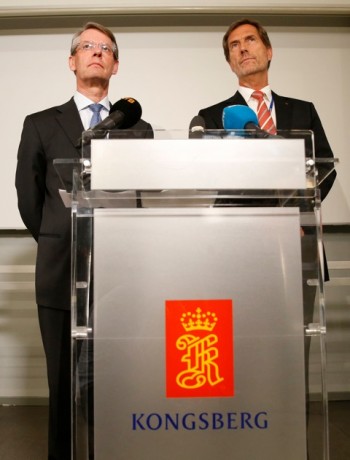As another corporate corruption scandal made more headlines in Norway this week, the bosses at defense contractor Kongsberg Gruppen had some explaining to do. They admitted that they’d had suspicions of their own over company contracts in Romania, but they failed to contact the authorities when their own investigation stalled.

Both the chairman (Finn Jebsen) and the chief executive (Walter Qvam) of Kongsberg faced reporters after the Norwegian police’s economic crimes unit Økokrim raided company offices and charged Kongsberg with corruption on Tuesday. Økokrim also later charged a Kongsberg employee who wasn’t identified. Qvam said the employee was not part of Kongsberg’s management.
Qvam did relate, though, that his management team had been tipped back in 2012 to the possibility that the nearly NOK 1.5 billion worth of contracts that Kongsberg’s defense communications unit had with Romanian customers were tainted with corruption. Qvam revealed that Kongsberg hired accounting firm PwC to investigate, and they spent nearly 13 months looking into the possibility of what appears to be suspected bribery.
The PwC report was never turned over to Økokrim, though. Instead, Qvam admitted, he and fellow top executives found the report inconclusive and chose not to share their suspicions with the police authorities. The facts were unclear, Qvam told newspaper Dagens Næringsliv (DN).
“The facts were unclear,” Qvam told DN. The report provided much more information than management initially had, “when it was all just rumours,” but Qvam said he and his management colleagues “were hunting for traces of actual transfers of money, for example” or “other types of actual transactions” that could be used as evidence.
Dead-ended at tax havens
Asked whether there were indications of transfers to accounts in tax havens, Qvam told DN: “Yes, that, too. But we didn’t manage to find out anything more. And the situation was such that it was all far back in time, and that complicated the work.” Økokrim’s charges cover the period from 1999 to 2008. Management, according to Qvam, didn’t receive the tip (via a text message, reported newspaper Aftenposten) about the alleged corruption until four years later.
So Kongsberg’s top managers, who had only briefly informed their board of directors that the PwC probe was underway, ended up informing Jebsen and the board that it was over, with no firm results. The company decided to just move on.
Both Qvam and Jebsen said they didn’t know that Økokrim was investigating, nor do they know how the suspicions of corruption landed with Økokrim, which raided Kongsberg’s offices in Asker, west of Oslo, and in the city of Kongsberg. The contracts involved were between Kongsberg and three Romanian government ministries and later other unspecified customers in Romania. They covered sales of, among other things, communications equipment for Romanian border control and for the Romanian foreign ministry, including encryption technology.
Defense contractors vulnerable
Kongsberg’s chairman and its chief executive said they are now cooperating fully with Økokrim, with Qvam noting that he and his staff had used “all our time” on Tuesday to assist Økokrim and arranged for Økokrim to interview “those persons they wanted to speak with.” He repeated claims that Kongsberg has “zero tolerance” for corruption, and toughened its own anti-corruption rules in 2009.
Asked whether Kongsberg’s anti-corruption program had thus failed, a company spokesman didn’t answer “yes” or “no” but told DN that the company “takes anti-corruption very seriously and the charges came as a surprise.”
Tine Søreide, a researcher and expert on corruption at the University of Bergen, told Aftenposten that the weapons and defense industry is especially vulnerable to corruption. “There are big contracts, lots of secrecy and there traditionally has been lots of smøring (the word Norwegians use for bribery or, literally, the greasing of palms),” Søreide said.
State owners uninformed
The Norwegian state owns 50 percent of Kongsberg’s shares, and the charges filed against the company come just a month after another large Norwegian company in which the state has a major stake, fertilizer producer Yara, was heavily fined for corruption by Økokrim and agreed to pay without contesting it. Monica Mæland, the Conservative Party’s new government minister in charge of business and trade, and responsible for the state’s ownership interests in otherwise private stockheld firms, said she knew nothing more about the case than what had been made publicly known on Monday.
“I have therefore nothing more to add other than to mention that this is of course serious,” Mæland told Aftenposten. The management’s notification to the board that its own probe was underway, and later dropped, must have escaped the attention of the state, even though it is Kongsberg’s single biggest shareholder.
Among the Kongsberg board members is Roar Flåthen, the former head of the powerful trade union federation LO, which has close ties to the Labour Party. His initial appointment to represent the state by Mæland’s predecessor, the former business and trade minister from the Labour Party Trond Giske, led to questions in Parliament because of complaints that it was another example of Giske appointing his allies to the boards of companies in which the state is a major shareholder. Giske had been charged with cronyism before, but Flåthen is now listed as a director of Kongsberg Gruppen. He was either unaware of the corruption suspicions or apparently failed to inform Mæland or other state officials about them.
Jebsen confirmed that he didn’t inform the state himself until Økokrim acted on Tuesday, claiming the board had only “superficially” been “oriented” about the corruption suspicions. “And the board was told that (management) together with external competence had decided to put the case aside,” Jebsen told Aftenposten. “We thought that a reassuring and defensible investigation had been conducted, with considerable external competence involved.”
newsinenglish.no/Nina Berglund

